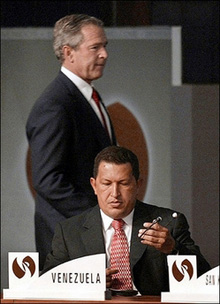 |
 |
 |
 Editorials | March 2007 Editorials | March 2007  
Thanks to Mr. Chávez
 NYTimes NYTimes


| | US President George W. Bush (behind) walks past Venezuelan President Hugo Chavez at a 2004 summit in Monterrey, Mexico. Bush criticized the economic model of his Venezuelan counterpart, saying it would lead to more poverty, on the eve of a tour of Latin America aimed at warning against the dangers of populism and isolationism. (AFP/Luke Frazza) |
Venezuela and its demagogic president, Hugo Chávez, won’t get a visit from President Bush. But Mr. Chávez’s appeal will be very much on Mr. Bush’s mind when he visits Latin America over the next week.

That’s actually a healthy development.

If your taste runs to three-hour speeches, chiseling away at democracy and a world-class personality cult, Mr. Chávez is your man. But if the goal is to lift millions of people out of grinding poverty, only a major effort by the United States — the hemisphere’s biggest economy and strongest democracy — can make a serious difference. And if it takes Mr. Chávez’s demagogy to spur Washington toward more enlightened policies in the Americas, so be it.

Concern over the popularity of Fidel Castro inspired the pro-democracy, pro-development policies of the Alliance for Progress during the Kennedy and Johnson administrations, one of the happier periods of inter-American relations.

In recent years, Washington has looked at Latin America with tunnel vision. It has selectively concerned itself with issues that have important political constituencies in the United States, like drug trafficking, immigration, military cooperation and trade and investment liberalization. And it has shortchanged many of the issues that matter most to Latin Americans, like development, poverty reduction, access to credit, education and health care.

Mr. Bush should use this trip, which will take him to Brazil, Uruguay, Guatemala, Colombia and Mexico, to start a new version of the alliance, one intended to reinforce democracy across the region. He should commit himself to ensuring that the benefits of expanded trade and investment reach the millions of Latin America’s urban and rural poor, not just the usual narrow elites.

He needs to challenge the uneven human rights performance of allies like Colombia and Guatemala. Washington’s double standard on human rights undercuts its credibility when pointing to Mr. Chávez’s intimidation and prosecution of critics.

The White House is promoting this tour as part of a new push to promote social justice in the hemisphere, and it cites a raft of what it calls new administration initiatives to that end. But a close examination reveals that many of these consist of little more than a repackaging of existing programs, including H.I.V./AIDS spending, debt relief, the Millennium Challenge program and trade agreements.

Still, the list includes some new and potentially useful ideas, like additional help for financing affordable mortgages, small business loans and health care training. These need to be significantly expanded. Mr. Bush deserves praise for doubling the assistance to Latin America, to $1.6 billion a year. But much of this has been for security programs in Colombia. A lot more will be needed if promoting social justice is to be more than a sound bite.

When Mr. Bush first ran for president seven years ago, he said that as governor of Texas, he had a special understanding of, and empathy for, Latin America. With Washington’s reputation in the hemisphere nearing its modern nadir, there could hardly be a better time to put that understanding and empathy to work. | 
 | |
 |



